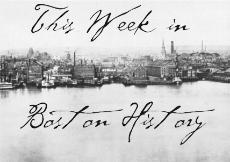November 27, 1773 Three ships from the British East India Company, loaded with hundreds of crates of Chinese tea, arrive at Boston Harbor. To protest the company’s commercial monopoly, angry colonists prevent the vessels from unloading their cargo. As British authorities anxious to bring the stuff ashore devise a plan for victory, Bostonian agitator Samuel Adams and his Sons of Liberty set to work on their own scheme. November 28, 1942 Nearly five hundred die in a fiery blaze at the Cocoanut Grove nightclub on Boston’s Piedmont Street. Following the tragedy, Massachusetts and other states would enact new building codes banning inward-swinging exit doors, while requiring that exit signs be visible at all times. The famous incident also triggered medical innovations in burn treatment and legal precedents in manslaughter law. November 29, 1832 Louisa May Alcott was born. The author spent much of her childhood in Concord, where she would set her most famous novel, Little Women. Alcott wrote also for the eminently respectable Boston magazine, the Atlantic Monthly. November 30, 1936 Abbie Hoffman born in Worcester, Massachusetts. A radical political activist, he was among the leaders of the countercultural pranksters, the Yippies. Rising to national prominence for his role in the 1968 Democratic Primary riots, Hoffman became a bestselling author, with works including Steal This Book and Revolution for the Hell of It. December 1, 1641 Massachusetts becomes first British colony to legalize slavery by statute. One hundred and forty years later, Massachusetts would become the first state to outlaw the “peculiar institution.” December 1, 1984 Boston College Quarterback Doug Flutie wins the Heisman Trophy, college football’s most prestigious award. A few months earlier, he made national headlines by leading the Eagles to dramatic victory with a hail mary pass, since remembered as one of the greatest moments in sports history. December 2, 1867 British author Charles Dickens kicks off his second American reading tour at Boston’s Tremont Temple. The enthusiastic audience included native luminaries Henry Wadsworth Longfellow and Ralph Waldo Emerson. December 3, 1860 At Tremont Temple, abolitionists Wendell Philips and Frederick Douglass are attacked by a pro-slavery mob at a memorial marking the one year anniversary of John Brown’s death. December 3, 1842 Ellen Swallow Richards born in Dunstable, MA. The first woman admitted to the Massachusetts Institute of Technology, she applied scientific principles to domestic management, including nutrition, fitness and sanitation – pioneering the field of home economics, or domestic science.
This Week in Boston History
November 27, 2006





















































